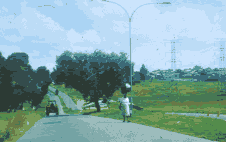Johannesburg,
Southafrica
- during the building of a new future
The spring-semester
of 2000 (Feb. thru' June)I was at the University of the Witwatersrand's
(Wits) department of Fine Arts. I had been granted a SIDA-scholarship
, thru' Bildmuseet in Umeå, Sweden, which meant a direct-exchange
so that two student from the Academy of Fine Arts there went to Johannesburg,
while two Wits-students spent the same time at Umeå's academy of
FA.
The spring of 2000(;
which is Southafrica's late summer and fall) I was in Johannesburg and
I would here like to share my experiences and thoughts with you. So please,
enjoy!..
'How's it!' is the most common way to greet people in Southafrica, which
does not mean that people are very interested in your personal health;
just reply 'nice seeing you!', to avoid surprised looks. I would like
to begin with some history; by the end of the 1400's Vasco
da Gama had sailed aronund the African southern cape on his way to India,
but nobody realized that you could really use the southern African continent
for anything untill much later. It would take 150 years until the Dutch
ship 'Haarlem' stranded close to where Cape Town is now situated, and
was left there for six months. The sailors grew vegetables and traded
peacefully for meat with the natives during that time. The language that
the natives spoke had a lot of clicking sounds, which the sailors thought
sounded like 'hot', 'tot' a.s.o. so that is why they began calling them
'Hottentots'. The politically correct word for that people is now Khoi-san.

This
is no Khoi-san, but a beautiful woman in Soweto,
who carries her burdens in the traditional African manner
Speaking of that I find the languages in Southafrica very interesting. There is not one Southafrican accent, since Southafrica has no less than eleven official languages! Zulu, Xhosa (, where Xh is pronounced as a click against your front-teeth ) and Afrikaans are the three largest ones, while English is just the fifth largest one. The English-speaking Southafricans also easily speak the African languages' click-sounds. In other places English-speaking people often claim that their mouths are not made for "all those strange sounds", like for instance the Scandinavian R.
click for
Passage - long Walk to Fortune